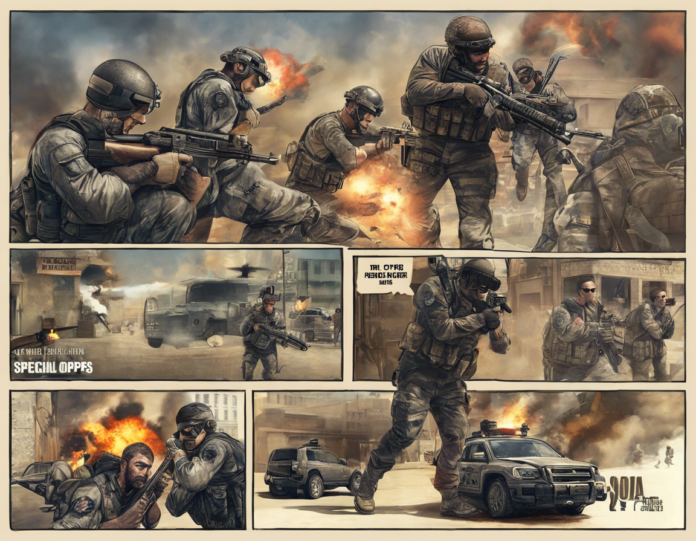Introduction
Special Operations Forces (SOF) are elite military units trained to carry out unconventional missions in high-risk environments. They are tasked with a wide range of operations, including counterterrorism, hostage rescue, reconnaissance, and direct action. These units are often the first to be deployed in high-stakes situations where a rapid and precise response is required. Special Ops forces are a crucial element in modern warfare, known for their advanced training, specialized skills, and unwavering commitment to mission success. In this article, we will delve into the world of Special Ops forces, their training, capabilities, and the impact they have on military operations.
What are Special Operations Forces?
Special Operations Forces (SOF) are elite military units that are specially trained and equipped to carry out unconventional missions. These units operate in small teams or groups and are known for their agility, adaptability, and stealth. Special Ops forces are typically drawn from the best and brightest within their respective military branches and undergo rigorous selection and training processes to prepare them for the challenges they may face in the field.
Types of Special Operations Forces
There are several types of Special Operations Forces, each with its own unique capabilities and focus. Some of the most well-known Special Ops units include:
-
Navy SEALs: The U.S. Navy SEALs are known for their expertise in maritime operations, counterterrorism, and direct action missions. They are highly trained in combat diving, parachuting, and close-quarters combat.
-
Army Special Forces (Green Berets): The U.S. Army Special Forces, also known as Green Berets, specialize in unconventional warfare, foreign internal defense, and counterinsurgency operations. They are experts in training and working alongside indigenous forces.
-
Delta Force: The 1st Special Forces Operational Detachment-Delta, commonly known as Delta Force, is a secretive U.S. Army unit specialized in counterterrorism and hostage rescue missions. They are considered one of the most elite Special Ops units in the world.
-
Special Air Service (SAS): The British Special Air Service is one of the oldest and most renowned Special Ops units in the world. They excel in counterterrorism, hostage rescue, and reconnaissance missions.
-
Joint Special Operations Command (JSOC): JSOC is a U.S. military command that oversees several Special Ops units, including Delta Force and SEAL Team 6. JSOC is responsible for some of the most sensitive and high-profile missions in the War on Terror.
Training and Selection
Special Operations Forces undergo some of the most rigorous and demanding training programs in the military. Selection processes are designed to identify individuals with the physical and mental fortitude to excel in high-stress environments. Training may include:
-
Physical Fitness: Special Ops candidates undergo intense physical training to build strength, endurance, and resilience. Physical fitness standards are exceptionally high, with candidates expected to excel in activities such as running, swimming, rucking, and calisthenics.
-
Combat Skills: Special Ops forces receive extensive training in a wide range of combat skills, including marksmanship, close-quarters battle, tactical driving, and hand-to-hand combat. They are proficient in a variety of weapons systems and tactics.
-
Specialized Training: Depending on their specialization, Special Ops forces may receive additional training in areas such as combat diving, military free-fall parachuting, survival evasion resistance escape (SERE) training, and foreign languages.
-
Teamwork and Leadership: Special Ops forces are trained to operate in small teams under arduous conditions. They learn to trust and rely on their teammates and to adapt quickly to changing circumstances. Leadership skills are also emphasized, as Special Ops operators are often called upon to lead missions independently.
Capabilities and Missions
Special Operations Forces are called upon to perform a wide range of missions, many of which are highly sensitive and classified. Some of the key capabilities and missions of Special Ops forces include:
-
Direct Action: Special Ops forces are trained to conduct high-risk raids and assaults against enemy targets. These missions may involve capturing or killing high-value targets, rescuing hostages, or gathering intelligence.
-
Counterterrorism: Special Ops units play a crucial role in counterterrorism operations, both at home and abroad. They are often at the forefront of efforts to disrupt terrorist networks and prevent attacks.
-
Unconventional Warfare: Special Ops forces excel in working with indigenous forces to achieve strategic objectives. They are skilled in training, advising, and assisting foreign partner forces in a variety of environments.
-
Special Reconnaissance: Special Ops units gather critical intelligence through surveillance, reconnaissance, and target acquisition missions. They provide real-time information to decision-makers and contribute to the overall situational awareness of a given area.
-
Counterinsurgency: Special Ops forces are instrumental in countering insurgencies by working with local populations to build trust, gather intelligence, and disrupt insurgent activities. They employ a combination of kinetic and non-kinetic strategies to achieve their objectives.
Impact on Military Operations
Special Operations Forces have a significant impact on military operations, both in peacetime and in conflict. Their unique capabilities allow them to operate in denied areas, behind enemy lines, and in other high-risk environments where conventional forces may struggle to succeed. Special Ops forces have a number of key advantages:
-
Speed and Agility: Special Ops units can rapidly deploy to crisis areas and respond to emerging threats with minimal delay. Their small size and specialized training enable them to move quickly and decisively.
-
Precision and Lethality: Special Ops forces are trained to deliver precise and effective strikes against enemy targets. Their expertise in marksmanship, close-quarters combat, and explosive breaching allows them to achieve their objectives with minimal collateral damage.
-
Covert Capabilities: Special Ops forces are adept at operating discreetly and maintaining a low profile. This enables them to gather intelligence, conduct surveillance, and execute sensitive missions without drawing unwanted attention.
-
Strategic Impact: Special Ops forces can have a disproportionate impact on the battlefield by targeting high-value individuals, disrupting enemy operations, and shaping the overall security environment. Their actions can influence the course of a conflict and contribute to strategic outcomes.
Frequently Asked Questions (FAQs)
- Are Special Operations Forces part of regular military units?
-
Special Operations Forces are distinct from regular military units and often report directly to specialized commands, such as U.S. Special Operations Command (USSOCOM) in the United States.
-
How are candidates selected for Special Ops training?
-
Candidates for Special Ops units undergo a rigorous selection process that assesses their physical fitness, mental toughness, and leadership capabilities. Only a small percentage of candidates who apply are selected for training.
-
What is the difference between Special Operations Forces and conventional forces?
-
Special Operations Forces are specialized military units trained for unconventional missions, such as counterterrorism, direct action, and unconventional warfare. Conventional forces, on the other hand, are larger units designed for traditional battlefield operations.
-
How does one become a member of a Special Ops unit?
-
To become a member of a Special Ops unit, individuals typically need to meet specific criteria, including passing selection courses, completing specialized training programs, and demonstrating exceptional skills and commitment.
-
What are some of the challenges faced by Special Ops forces?
-
Special Operations Forces face a range of challenges, including operating in hostile environments, extended periods of isolation, physical and mental stress, and the need to maintain a high level of proficiency in diverse skill sets.
-
What is the role of Special Ops forces in counterterrorism operations?
-
Special Ops forces play a critical role in counterterrorism operations by conducting high-risk missions to capture or eliminate terrorist threats, gather intelligence, and disrupt terrorist networks.
-
Do Special Ops forces work with other military and government agencies?
-
Yes, Special Operations Forces often collaborate with other military units, intelligence agencies, and government organizations to achieve shared objectives. This interagency cooperation enhances their effectiveness and impact.
-
What sets Special Operations Forces apart from conventional military units?
-
Special Operations Forces are distinguished by their specialized training, small team structure, emphasis on unconventional missions, and ability to operate in high-risk environments with minimal support.
-
What is the historical background of Special Operations Forces?
-
Special Operations Forces have a long and storied history dating back to World War II, where elite units such as the British Commandos and U.S. Army Rangers laid the groundwork for modern Special Ops forces.
-
How do Special Ops forces maintain a high level of readiness and proficiency?
- Special Ops forces undergo regular training exercises, simulated missions, and real-world deployments to stay sharp and maintain their skills. Continuous training and evaluation are crucial to their effectiveness in high-stress situations.
Conclusion
Special Operations Forces play a vital role in modern warfare, bringing unique capabilities, specialized skills, and unwavering dedication to the most challenging missions. These elite units are at the forefront of efforts to combat terrorism, support stability operations, and protect national security interests. Special Ops forces operate in the shadows, often unseen but always ready to respond with precision and determination. Their impact on military operations is undeniable, shaping the course of conflicts and contributing to strategic outcomes. As the nature of warfare continues to evolve, Special Operations Forces will remain a critical asset in the arsenal of nations around the world.


Recent comments